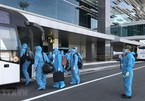The right to freedom of movement was stipulated for the first time in Article 13 of the 1948 Universal Declaration of Human Rights, which says everyone has the right to freedom of movement and residence within the borders of any state and to leave any country, including his own, and to return to his country.

Vietnam expects to launch domestic Covid-19 vaccine by October 2021
Foreigners, who live and stay legally in a country, have the right to freedom of movement within the borders of that country without any obstacles.
The right to freedom of movement is a prerequisite for a person to enjoy civil, political, economic, social, and cultural rights. The right to freedom of movement is a condition for every country’s socio-economic development.
Freedom of movement is an important part of cooperation between countries because the exchange of information and knowledge strengthens understanding between peoples of different cultures, tears down prejudices, fosters solidarity, and promotes peace, humanity, and prosperity.
Illegal restriction of the freedom of movement violates human rights and obstructs social development. The right to freedom of movement is stipulated and protected by the constitutions and laws of many countries.
In Vietnam, the right to freedom of movement is a fundamental human right stipulated in Article 23 of the 2013 Constitution: “The citizen shall enjoy freedom of movement and residence within the country, and can freely travel abroad and return home from abroad.” This wording is similar to that of international legal documents on human rights.
Movement and residence of Vietnamese citizens and foreigners in Vietnam is also mentioned in the Civil Code, the Nationality Law, the Investment Law, the Residence Law, and other legal documents. The Vietnamese government has signed 78 treaties and bilateral agreements granting visa exemptions to citizens of other countries and territories and border treaties with neighboring countries to make international movement easier.
Despite COVID-19, the Vietnamese Party and State have honored commitments to ensure people’s freedom of movement. When the epidemic was not yet under control, the Prime Minister decided that social distancing restrictions were necessary and in line with Vietnamese and international laws ensuring people’s right to freedom of movement.
Article 12 of the 1966 International Covenant on Civil and Political Rights says the right to freedom of movement is subject to restrictions provided by law which are necessary to protect national security, public order, public health, morality, or the rights and freedoms of others.
Clause 2, Article 14, of the 2013 Constitution says human rights and citizens’ rights shall only be restricted when prescribed by law in imperative circumstances for reasons of national defense, national security, social order and security, social morality, and community well-being.
The right to freedom of movement is an important element of human rights. When public health was threatened by the COVID-19 pandemic, the Prime Minister called for social distancing to prevent the disease from spreading.
That decision was supported by the public, who recognized the importance of containing the disease. Social distancing was one of the keys to Vietnam’s successful containment of the COVID-19 pandemic.
Vietnamese Party and State have strengthened immigration management during the pandemic. On March 18, Vietnam suspended 30-day visas for foreigners, a decision in line with international law.
General Comment 27 of the 1999 Human Rights Council on Article 12 of the ICCPR says that when an alien is lawfully within the territory of a State is a matter governed by domestic law, which may restrict the entry of an alien to the territory of a State, provided the restrictions are in compliance with the State’s international obligations.
Under Vietnamese law, the right to freedom of movement is not an absolute right but a right subject to restrictions required for reasons of national defense, national security, social order and security, social morality, and community well-being.
With the COVID-19 pandemic still spreading globally and most international flights suspended for health safety reasons, the Vietnamese Party and State has conducted flights to repatriate nearly 50,000 Vietnamese citizens from 48 countries and territories.
This effort is in line with Vietnam’s commitment to ensure the rights of citizens stipulated in the 2013 Constitution and international legal documents and reflects the humanitarian spirit of the Vietnamese Party, State and people.
Now that COVID-19 has been contained domestically, Vietnam has resumed commercial flights to a number of countries and territories and certain foreigners are allowed to enter Vietnam. Vietnam Airlines and Vietjet Air have resumed flights to safe destinations in Japan, the Republic of Korea, and Taiwan, China.
The Vietnamese Party and State will continue to ensure the fundamental rights of citizens, including the right to freedom of movement, in line with Vietnamese and international law.
VOV

Vietnam reports no COVID-19 cases early October 18
The number of COVID-19 cases in Vietnam remained at 1,126 on October 18 morning as no new infections were recorded over the last 12 hours, according to the national steering committee for COVID-19 prevention and control.